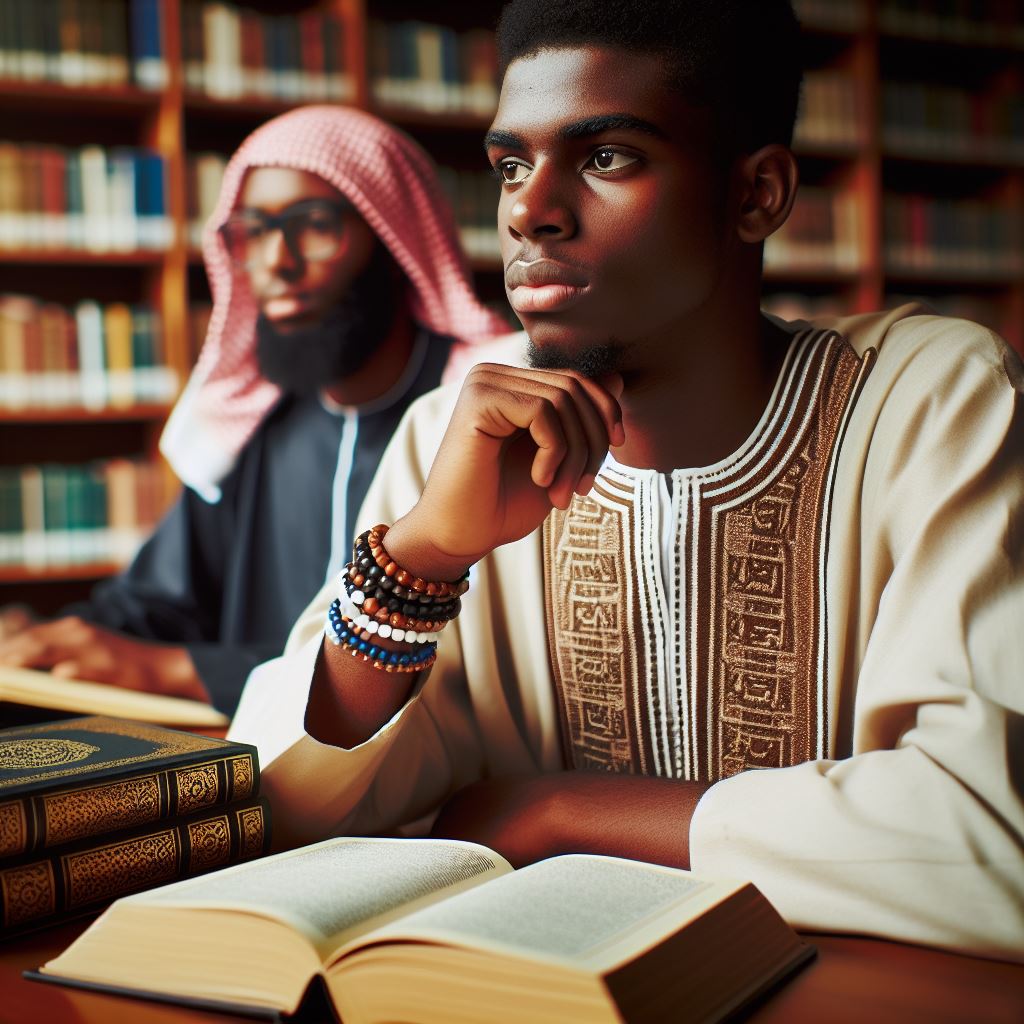Introduction
Brief Overview of the History and Importance
Arabic and Islamic education in Nigeria dates back several centuries. It plays a crucial role in the country’s religious and cultural development. Initially, Islamic education spread through the efforts of dedicated scholars.
Influence of Arab Traders and Scholars
Arab traders and scholars significantly influenced Nigeria’s Islamic education. They introduced the Arabic language and Islamic teachings. Their contributions include:
- Establishing Quranic schools
- Promoting literacy and religious knowledge
- Fostering trade and cultural exchanges
Their legacy continues to shape Nigeria’s educational landscape.
Pre-colonial era: Roots of Arabic and Islamic Education
Exploration of the early introduction of Arabic and Islamic education in Nigeria dates back to centuries ago when trade and commerce were the predominant activities in the region.
The trans-Saharan trade routes played a significant role in the spread of Islam and Arabic knowledge to the region.
Islamic scholars and teachers, known as Mallams in Hausa or Ustaz in Arabic, played a pivotal role in disseminating knowledge among the people.
They were highly respected and revered in society for their knowledge and wisdom. These scholars were responsible for teaching Arabic language, Quranic studies, Islamic jurisprudence, and other aspects of Islamic education.
The traditional mode of teaching was through the memorization and recitation of the Quran, known as Tahfiz. Students would spend hours learning and memorizing the verses of the Quran under the guidance of their teachers.
This method of education helped in preserving the Quran and passing down the knowledge from one generation to another.
Arabic and Islamic education was not only limited to religious studies but also included subjects such as mathematics, astronomy, medicine, and philosophy.
Islamic scholars were well-versed in various fields of knowledge and played a crucial role in the intellectual development of the society.
Key points
- Introduction of Arabic and Islamic education through trade routes
- Role of Islamic scholars in spreading knowledge
- Traditional mode of teaching through memorization and recitation
- Inclusion of subjects beyond religious studies in Islamic education
Read: Career Paths in Communication and Language Arts
Colonial era: Impact of British rule on Arabic and Islamic Education
During the colonial era in Nigeria, British rule had a significant impact on the traditional Islamic education system.
This period marked a shift in the educational landscape of the country as efforts were made to Westernize the educational curriculum and institutions.
Changes in the educational system
- The British colonial authorities introduced a new system of education that emphasized Western knowledge and values.
- Islamic and Arabic schools were marginalized and viewed as inferior to the new Western-style schools.
- Curriculum in Islamic schools was de-emphasized in favor of subjects like English, Math, and Science.
Westernization of educational institutions
- British colonial authorities took control of the education system and implemented policies that favored Western education.
- Islamic schools faced discrimination and were not given adequate resources or support compared to Western-style schools.
- Efforts were made to integrate Islamic schools into the Western educational system, leading to a decline in the traditional Islamic education system.
Impact on Arabic and Islamic education
- Many Islamic scholars and educators resisted the Westernization of education and fought to preserve traditional Islamic teachings.
- Islamic educational institutions struggled to compete with Western-style schools that were seen as more prestigious and modern.
- The influence of British colonialism led to a decline in the quality and relevance of Arabic and Islamic education in Nigeria.
In general, the colonial era in Nigeria had a profound impact on Arabic and Islamic education, leading to the marginalization of traditional Islamic schools and the promotion of Western education.
The legacy of British rule continues to be felt in the educational system of Nigeria today, as efforts are made to balance Western education with the preservation of traditional Islamic teachings.
Read: Global Impact of African and Asian Studies Research
Post-independence era: Revival and growth of Arabic and Islamic Education
In the post-independence era, there was a significant revival and growth of Arabic and Islamic education in Nigeria.
This period marked a resurgence of interest in traditional Islamic learning systems. Let’s delve into the details of this revival and the establishment of Islamic schools and universities in the country.
Resurgence of Interest in Arabic and Islamic Education
After gaining independence from British colonial rule in 1960, Nigeria witnessed a renewed interest in Arabic and Islamic education. This was partly due to a growing sense of cultural identity and a desire to reclaim traditional educational practices.
Many Nigerians, particularly in the northern regions where Islam has a strong presence, began to realize the importance of preserving and promoting Islamic knowledge.
As a result, there was a resurgence in the establishment of Arabic and Islamic schools across the country.
Establishment of Islamic Schools and Universities
To meet the increasing demand for Islamic education, numerous Islamic schools were established in Nigeria post-independence. These schools focused on teaching Arabic language, Quranic studies, Islamic jurisprudence, and other religious subjects.
In addition to primary and secondary schools, several universities dedicated to Islamic studies were also founded during this period.
These institutions aimed to provide higher education opportunities for students interested in pursuing advanced studies in Islamic theology, law, and history.
One of the notable universities established for Islamic education is the Bayero University Kano, which offers degree programs in Islamic studies and Arabic language. This institution has played a crucial role in promoting academic research and scholarship in Islamic studies in Nigeria.
Impact on Society and Education System
The revival and growth of Arabic and Islamic education in Nigeria post-independence have had a significant impact on society and the education system.
Islamic schools have helped preserve traditional knowledge and values, fostering a sense of cultural heritage among students.
Moreover, the establishment of Islamic universities has contributed to the academic and intellectual development of the country. These institutions have produced scholars and researchers who have made valuable contributions to the field of Islamic studies and beyond.
Overall, the post-independence era marked a pivotal period in the history of Arabic and Islamic education in Nigeria.
The resurgence of interest in traditional learning systems and the establishment of schools and universities have played a crucial role in promoting Islamic education and preserving cultural heritage in the country.
In review, the post-independence era witnessed a remarkable revival and growth of Arabic and Islamic education in Nigeria.
This period not only reaffirmed the importance of traditional knowledge systems but also paved the way for academic excellence and intellectual development in the field of Islamic studies.
Read: Language Learning in African and Asian Studies

You Might Also Like: Historical Preservation and Archival Science in Nigeria
Uncover the Details: Economic Anthropology: Trade Systems in Nigeria
Challenges faced by Arabic and Islamic Education in Nigeria
As Arabic and Islamic education continue to play a significant role in Nigeria, there are various challenges that hinder their growth and development.
- One of the major obstacles is the lack of funding for Arabic and Islamic schools in Nigeria.
- Many of these educational institutions struggle to sustain themselves due to inadequate financial support.
- Additionally, the lack of infrastructure poses a significant challenge to the effective delivery of Arabic and Islamic education.
- Most schools face issues such as overcrowded classrooms, inadequate teaching materials, and poor facilities.
- Furthermore, the low level of recognition for Arabic and Islamic education in the country is a pressing concern.
Analysis of the obstacles and limitations hindering the growth of Arabic and Islamic education
The challenges faced by Arabic and Islamic education in Nigeria are multi-faceted and require comprehensive solutions to address them effectively.
- One of the primary issues is the lack of government support and recognition for Arabic and Islamic schools.
- Many of these institutions do not receive the necessary backing from authorities, hindering their development.
- Moreover, the shortage of qualified teachers in Arabic and Islamic studies is a significant challenge.
- Without well-trained educators, the quality of education provided in these schools may be compromised.
- Another critical challenge is the negative perception of Arabic and Islamic education in Nigeria.
Issues such as lack of funding, infrastructure, and recognition
The lack of adequate funding is a pervasive problem that affects the overall quality of Arabic and Islamic education in Nigeria.
Without sufficient financial resources, schools struggle to maintain proper facilities, purchase teaching materials, and attract qualified teachers.
Furthermore, the poor state of infrastructure in many Arabic and Islamic schools hinders the effective delivery of education.
Overcrowded classrooms, lack of basic amenities, and substandard facilities create a challenging learning environment for students.
Moreover, the limited recognition of Arabic and Islamic education in Nigeria contributes to the marginalization of these educational institutions.
Without official accreditation and support, these schools may struggle to compete with mainstream educational institutions and gain legitimacy in the eyes of society.
Therefore, addressing the challenges faced by Arabic and Islamic education in Nigeria requires a concerted effort from various stakeholders.
By addressing issues such as funding, infrastructure, and recognition, the quality of education in these institutions can be improved, ensuring a brighter future for students pursuing Arabic and Islamic studies.
Read: Scholarships for Communication Arts Students in Nigeria
Learn More: Tips for Marketing Your Fashion Brand in Nigeria
Current status and future prospects of Arabic and Islamic Education
Evaluation of the current state of Arabic and Islamic education in Nigeria
Arabic and Islamic education in Nigeria have a rich history and deep cultural significance.
The current state of Arabic and Islamic education in Nigeria is relatively strong.
There are numerous Islamic schools and institutions across the country that offer quality education.
These schools prioritize the teaching of Arabic language, Quranic studies, and Islamic principles.
Transform Your Career with Expert Guidance
Get personalized mentorship consulting that’s tailored to your unique path. Our expert advice is actionable and exclusive.
Get StartedStudents in these institutions have the opportunity to learn about the history and teachings of Islam.
Many Islamic schools in Nigeria have well-trained teachers who are dedicated to providing a holistic education.
The curriculum in these schools blends traditional Islamic teachings with modern academic subjects.
Students who graduate from these institutions often go on to pursue higher education in various fields.
Islamic education in Nigeria has a significant influence on the moral and ethical development of students.
The emphasis on religious teachings helps students develop a strong sense of discipline and spirituality.
Overall, the current state of Arabic and Islamic education in Nigeria is promising and continues to thrive.
Exploration of potential developments and advancements in the field
As technology advances, there is a growing opportunity to integrate digital tools into Islamic education.
Online platforms and mobile applications can enhance the learning experience for students studying Arabic and Islamic subjects.
Interactive learning tools can help students engage with the material in a more dynamic way.
E-books and multimedia resources can provide additional support for students learning Arabic and studying the Quran.
The use of virtual classrooms can create opportunities for students to connect with scholars and educators from around the world.
Developing a standardized curriculum for Arabic and Islamic education can help ensure quality and consistency across all institutions.
Training programs for teachers can also help improve the quality of education being offered in Islamic schools.
Encouraging research and scholarship in the field of Arabic and Islamic studies can lead to new discoveries and insights.
Collaboration with international organizations and academic institutions can promote cross-cultural understanding and exchange.
Investing in infrastructure and resources for Islamic schools can help create a conducive learning environment for students.
In a nutshell, the field of Arabic and Islamic education in Nigeria holds great promise for future growth and development.
Learn More: Nigerian Languages: Regional Variations and Dialects
Gain More Insights: Benefits of Studying Foreign Languages in Nigeria
Uncover the Details: Fine vs. Applied Art: Key Differences Explained
Conclusion
History of Arabic and Islamic Education in Nigeria
Arabic and Islamic education have been longstanding traditions in Nigeria.
These forms of education date back centuries and have played a significant role in shaping Nigerian society.
Islamic education flourished in Nigeria through the spread of Islam by traders and scholars.
Arabic was used as the language of learning, with Quranic schools being established across the country.
These schools taught Arabic language, Islamic studies, and memorization of the Quran.
Over time, Arabic and Islamic education became deeply embedded in Nigerian culture.
Today, the teaching of Arabic and Islamic studies continues to be an important part of Nigeria’s educational system.
Call to action for the preservation and promotion of Arabic and Islamic education in Nigeria
In closing, the history of Arabic and Islamic education in Nigeria is rich and extensive.
We have discussed the deep-rooted traditions and significance of these forms of education in Nigerian society.
It is important to preserve and promote Arabic and Islamic education in Nigeria for future generations.
Let us continue to support and strengthen these educational practices in order to uphold our cultural heritage and values.




